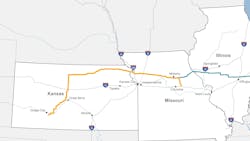Department of Energy Cancels $4.9 Billion Loan Guarantee for HVDC Transmission Line
The Department of Energy (DOE) today announced the Loan Programs Office (LPO) has terminated its conditional commitment for the Grain Belt Express Phase 1 project, a high-voltage direct current (HVDC) transmission line intended to connect wind and solar capacity across Kansas and Missouri. The conditional commitment would have provided a loan guarantee of up to $4.9 billion dollars.
After a thorough review of the project’s financials, DOE stated that it found that the conditions necessary to issue the guarantee are unlikely to be met and it is not critical for the federal government to have a role in supporting this project.
"To ensure more responsible stewardship of taxpayer resources, DOE has terminated its conditional commitment," the DOE release said.
DOE is conducting a review of every applicant and borrower – including the nearly $100 billion in closed loans and conditional commitments LPO made between Election Day 2024 to Inauguration Day 2025.
The Grain Belt Express transmission line, meant to provide 5,000 MW of additional energy delivery capacity, was to go through Kansas, Missouri, Illinois and Indiana. The line secured the last of its approvals in October 2023, when the Missouri Public Service Commission (MPSC) approved its request to amend its existing Certificate of Convenience and Necessity.
"The Grain Belt Transmission Line was proposed in 2010. It took 14 years to get landowners to agree to a path and secure the contracts to build the line," wrote industry veteran Doug Houseman, a regular contributor to T&D World, on Linkedin. "Fourteen years that were spent stitching the rights-of-way together, getting state commission approval, which were needed get zoning changes."
There has been a flurry of activity over the past couple of weeks as the DOE reviewed the project. Missouri Senator Josh Hawley tweeted on July 10 that he had a "great conversation" with Donald Trump and Energy Secretary Chris Wright. "Wright said he will be putting a stop to the Grain Belt Express green scam. It's costing taxpayers billions."
Grain Belt Express then issued a statement in reponse: "This is bizarre. Senator Hawley is attempting to kill the largest transmission infrastructure project in U.S. history which is already approved by four states and is aligned with the President’s energy dominance agenda. Senator Hawley is trying to deprive Americans billions of dollars in energy cost savings, thousands of jobs, grid reliability and national security, all in an era of exponentially growing demand."
Grain Belt Express — the largest transmission infrastructure project in U.S. history — said it was going to deliver:
-
- $52 billion in energy cost savings for American consumers
- Grid reliability for regions serving 25% of defense infrastructure facilities and 40% of American households
- 5,500 American jobs
- $11 billion investment in American-energy infrastructure
- The domestic manufacturing renaissance
- 5,000 megawatts of any and all American-made energy sources
The Grain Belt Express also sent a letter to U.S. Secretary of Energy Chris Wright on July 11, urging President Trump to support the transmission project, emphasizing its vital role in strengthening U.S. energy security, grid reliability, and affordability for millions of Americans. The 800-mile project, backed by a diverse coalition and extensive regulatory approval, would connect four major grid regions, deliver power equivalent to four nuclear plants, and generate significant economic benefits, including cost savings for Missouri municipalities and major U.S. manufacturing jobs. The letter criticized "politically motivated opposition" from Senator Josh Hawley and Missouri Attorney General Andrew Bailey, calling their efforts to derail the project through legal and media attacks unfounded and harmful to national interests. It concluded by framing the Grain Belt Express as a crucial test of America’s ability to build essential energy infrastructure in an era of surging demand.
According to Doug Houseman, the momentum to build the next line could go away. "Who spends 15 years planning a project (and laying out tens of millions to do so) only to have it cancelled? Instead of creating a continent-wide set of improvements to the transmission system (even with FERC Order 1920) investor may revert to 10–70-mile improvements contained within a single state."
Brownfield Ag News reported that eminent domain has been a concern of some landowners, and Missouri Farm Bureau President Garrett Hawkins said he was pleased to see the commitment from President Trump and the Energy Department to halt a loan guarantee and calls it a massive victory for property rights.
The end of the DOE’s conditional loan guarantee marks a dramatic turn in the long and often contentious journey of the Grain Belt Express. What was once touted as a transformative project for America’s electric grid—linking renewable power across four states and promising billions in savings and reliability gains—has now become a flashpoint in a larger debate over energy policy, federal investment, and property rights. While supporters frame the cancellation as a setback for national energy resilience and infrastructure modernization, critics celebrate it as a win for local landowners and fiscal restraint. With the project’s future now uncertain, the decision could have broader implications for how the U.S. approaches large-scale transmission development at a time of rapidly rising electricity demand and political division over how to meet it.
About the Author
Nikki Chandler
Group Editorial Director, Energy
Nikki is Group Editorial Director of the Endeavor Business Media Energy group that includes T&D World, EnergyTech and Microgrid Knowledge media brands. She has 29 years of experience as an award-winning business-to-business editor, with 24 years of it covering the electric utility industry. She started out as an editorial intern with T&D World while finishing her degree, then joined Mobile Radio Technology and RF Design magazines. She returned to T&D World as an online editor in 2002. She has contributed to several publications over the past 25 years, including Waste Age, Wireless Review, Power Electronics Technology, and Arkansas Times. She graduated Phi Beta Kappa with a B.S. in journalism from the University of Kansas.

